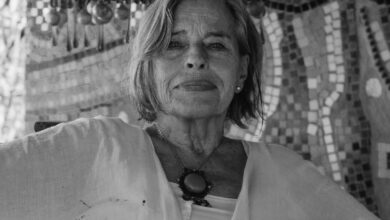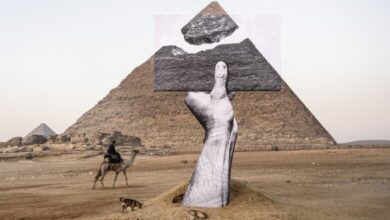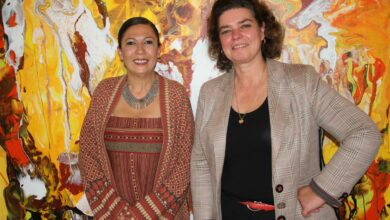Amid the historic monuments and towering minarets lining the streets of Islamic Cairo stands Beit el-Shaer (The Poet’s House), the latest addition to the city’s growing number of cultural centers.
Located in the heart of the district on the newly refurbished El Moez Eddin Allah street, Beit el-Shaer is surrounded by a wealth of cultural and historical landmarks, including the Sultan Qala’un mosque, of which the newly-inaugurated center enjoys an inspiring view. Its stunning location aside, Beit el-Shaer manages to stand out from the budding crowd of cultural centers, mainly due to the attention of its founder, well-known television personality and writer, Gamal el-Shaer.
“I’ve been dreaming about finding a place here for the past twenty-five years,” says el-Shaer excitedly as he sits down to talk with Al-Masry Al-Youm in his office at Beit al-Shaer, which, like the other rooms in the cultural center, is tastefully decorated with arabesque furnishings as well as works by local and international artists. “I’m not just passionate about this neighborhood, I’m obsessed with it. I am inexplicably attached to it. I used to come here at night to walk around and knock on people’s doors, just to talk to them and try to find out if there were any places available.”
El-Shaer leans forward, resting his hands on a tabletop already covered with a scattering of loose tiles, messily painted in bright colors. He glances out the adjacent window at the rooftops and minarets of his neighborhood, warmly glowing against the dark night sky. “This place was calling to me,” he says in a low voice, “like a siren.”
El-Shaer’s search came to an end two years ago when he found what he felt was the ideal location for his center. In the time since then, the building has undergone extensive renovation, which el-Shaer personally supervised in order to ensure that the original aesthetic would not be lost in the transformation. As a result, Beit el-Shaer, which held its soft opening on the first day of the new year with a street-festival celebration, promises to provide a unique backdrop for any future events held at its premises. The process may have been challenging, but el-Shaer is the first to admit it was worth it.
In spite of its name, Beit el-Shaer will not be devoted entirely to poetry, but rather the spirit of it. “We live in the age of ‘videology,’" says el-Shaer, frowning. “Image is everything. Film, television, music videos. We want to bring back the spirit of poetry, the essence of imagination. Poetry is the gateway to creativity. [Egyptian author] Yehia Hakki once said “This nation needs a poet to restore its faded glory”, and a true poet must first and foremost be an artist.”
Correspondingly, Beit el-Shaer’s walls are adorned with original works by several artists, spanning different mediums and time periods, and the center’s program for the next few months includes events tailored to all artistic and cultural interests, from the standard photography and creative writing courses, to lesser-known arts, like Mamluk cuisine. Future plans for Beit el-Shaer also include a regular publication, collaborations with German and American universities, such as Georgetown, as well as residency programs for foreign artists, and the “Birth Certificate” project, which aims to help artists of all mediums produce their first serious work. Recently, Beit el-Shaer hosted the Hamburg Choir, which sang German and Arabic folk songs in an event open to the entire neighborhood, and was broadcast live on screens set up on Moez Street.
“It was beautiful,” el-Shaer says, flipping through a photo-album documenting the concert. “At one point, one of the old women selling bread on the street asked me if she should go home and put on a fancy dress.”
“This area is enchanted with the magic of history,” El-Shaer says dramatically. “It is the origin of the city we live in today. El Moez was the Champs-Élysées of Old Cairo. Think of all the different people who have passed through here—the Mamluks, Ottomans, Ayoubis, Greeks, English, French, Armenians—everyone. It is a meeting point of early and contemporary Cairo. It is a reconciliation between past and present, where they meet and shake hands.” He turns and points out the window. “You know “Palace Walk” by Naguib Mahfouz? That’s over there, right outside my window.”
For its owner, Beit el-Shaer is a labor of two loves—that of Islamic Cairo, as well as the arts. Besides his work in television, el-Shaer is also an acclaimed poet with several published works, including 2009’s wryly amusing collection, “My Darling, Einstein Doesn’t Bite.” This passion is appropriate for a man whose name translates as "The Poet." In an amusing play on words that el-Shaer is quick to point out, the name of his cultural center can accurately be translated as "The Poet’s House," or, cleverer still, "A Poetic Verse." “Works nicely, doesn’t it?” he says smiling as he hands the interviewer a souvenir tarboosh.
El-Shaer’s love for the neighborhood extends to its residents, who he claims have enthusiastically welcomed the new cultural center. Beit el-Shaer is effectively a gallery showcasing the talents of the local carpenters and artisans, and on more than one occasion el-Shaer interrupts himself to admire a piece of furniture. “That chair is by Ayman Arabisk, that’s his name,” el-Shaer says as he points to a unique combination of wood and rope. He runs his hands over the tabletop, and picks up one of the many painted tiles. “These were painted by the kids downstairs working in the shops. Look,” he says holding up a particularly chaotic tile. “This boy tried to write in English. Nobody asked him to do that. These kids want to create and they want to learn. I’m really proud of that.”
“I dream of a giant evolutionary leap in Egyptian creativity,” says El-Shaer. “This is just a first step. In a country of 80 million, we need as many cultural centers as possible.”
Refreshingly, El-Shaer is optimistic about today’s younger generation. When asked if he senses a decline in artistic interests on their part, El-Shaer is quick to reply, “I don’t believe in that cynical view. There’s nothing wrong with the younger generation. They’re open-minded, outgoing, technologically adept, and smart. They listen to [pop star] Tamer Hosni but they also like [folksinger] Mohamed Mounir. There’s more to the young generations than people give them credit for; they just need proper stimulation. You can’t let them hang out in chat rooms all day long.”
Gamal el-Shaer smiles, holding up another tile. “Poetry,” he says “is just the starting point.”
Beit el-Shaer is sponsored by Arab Contractors and the Insurance Holding Company.




